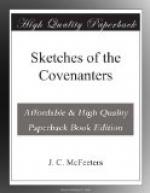The Lord Jesus asks the Church for reciprocal love. It is His due; Christ is worthy; nothing less than vehement love will satisfy the Divine heart. The apostle, in dread of its subsidence, cries out, “Keep yourselves in the love of God.” How readily the Church, in interest and zeal, becomes cold. Her spiritual pulse sinks till it is scarcely perceptible; the flames disappear, and the coals lie hidden in their own grey ashes.
With such conditions the Lord is vexed. He gently chides His inconstant Bride, saying, “Thou hast left thy first love. Remember therefore from whence thou art fallen; repent, and do the first works.” Then in unwaning faithfulness He tenderly soliloquizes: “Behold, I will allure her, and bring her into the wilderness, and speak comfortably unto her; and she shall sing as in the days of her youth.” The Covenanted Church was now in the wilderness; the Lord had brought her hither, that He might woo her back to Himself, and revive her first love. Here He spake to her heart the words that rekindled the fires of her earliest and strongest devotion to the Covenant, that holy contract of her marriage to the Lord.
The loving fidelity of the 40,000 Covenanters, or more, who had been deprived of their ministers by King Charles, was severely tested. The Lord Jesus, in His crucial providence, was to them as a refiner’s fire; their love was sorely tried in the terrible heat.
The first question that appealed to the heart was concerning comfort and convenience. Their churches were occupied by other ministers. There the people could have preaching, hear the Word, listen to prayers, sing Psalms, and receive baptism and the Lord’s Supper. True, the services were spiced and ornamented with details, which the Covenanters disliked, because they were unscriptural. But could they not find hidden manna on the sand, and kernels of wheat in the chaff? Could they not get sufficient food in the new ministrations to sustain their souls? Could they not reach heaven by the new road as certainly as by the old? Such were the inquiries that appealed to their love of ease. These sturdy sons of the Covenant said, “No.” They said it, too, with emphasis like the lightning that strikes the oak. They said, “Public worship, not in all parts according to the Book of God, is corrupt; we will not participate in such services, for the Lord has said, ’Cursed be the deceiver, that sacrificeth unto the Lord a corrupt thing.’”
The second question was concerning the imminent dangers that attended their own services. Their meetings were held in distant places; in the lonely mountain, on the homeless moor, in the swampy moss, in the dark glen, among the rugged rocks, and in the dreary cave—just wherever they could find a place to worship God in peace. They had no roof for shelter, no walls to break the storm, no fires for heat. Attending these meetings involved travel, weariness, hunger, exposure, loss of sleep, shivering in the cold, every




